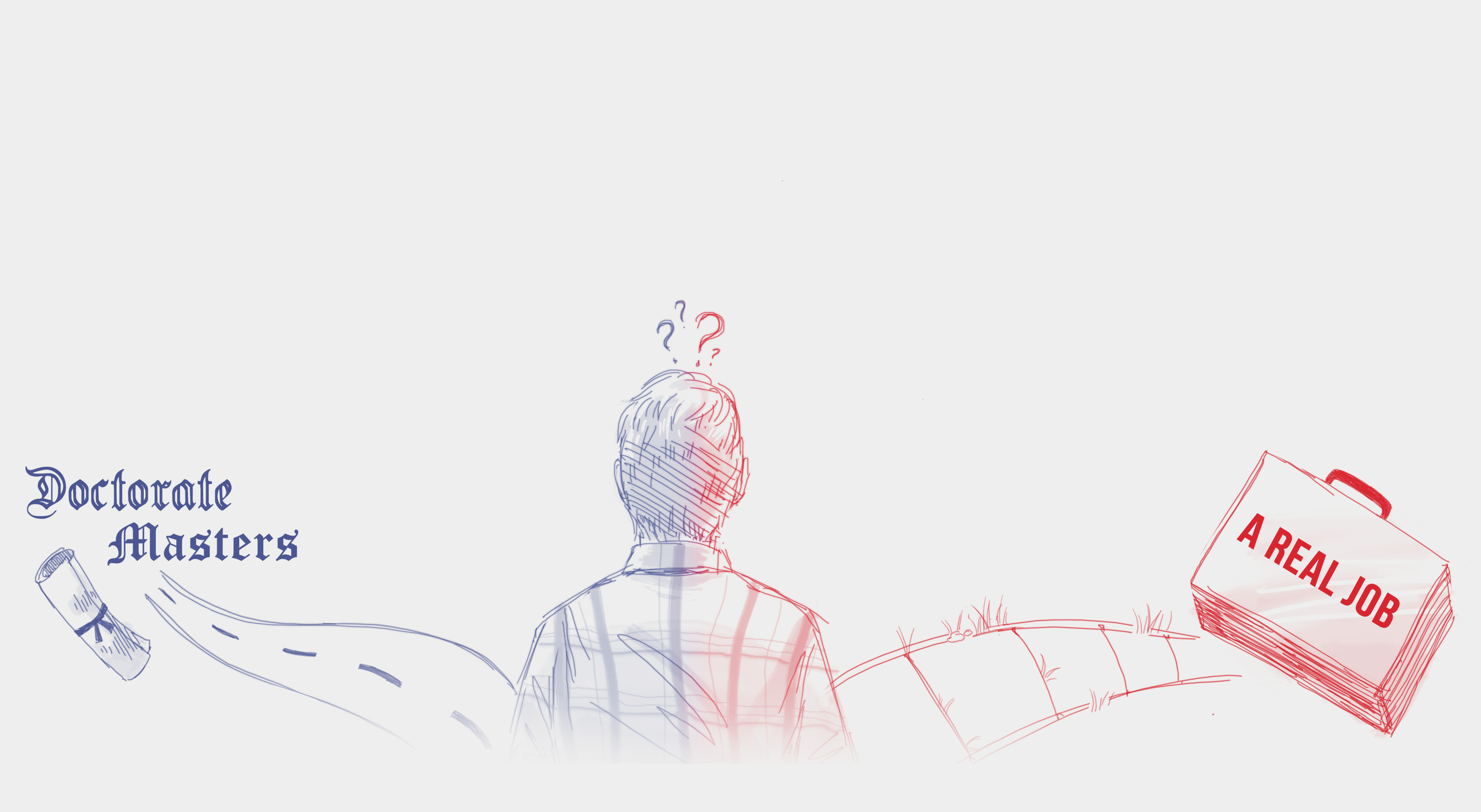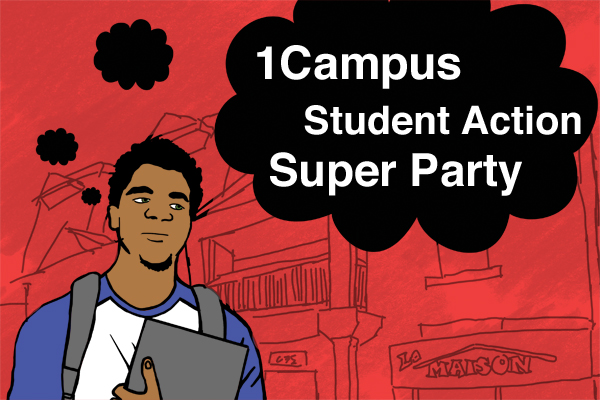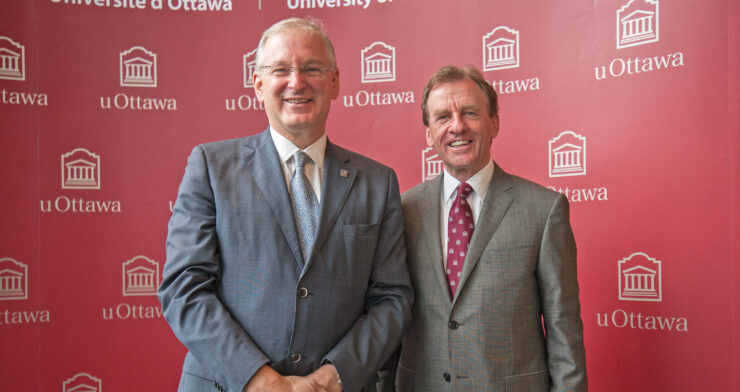Grad students weigh in on the challenges and benefits on the road to a PhD
Investing in a PhD is a big decision. It usually means pushing an already long academic career in post-secondary education up to the 11-year mark, at least. In the words of one professor, it can mean “working for years for very little money while you watch your friends get rich.”
Not only that, the PhD itself is in flux. Academic jobs, the stereotypical application of the degree, can be hard to come by. Universities get strong, qualified applicants all the time, and yet many of these job seekers leave disappointed, or suspended in part-time positions with little job security.
And yet the number of students starting their doctorate has been rising steadily for years.
While the PhD is changing, the shifts are far more complex than the changes in academic employment. For many students, it means more work and a more creative approach, but not necessarily a sense of impending doom.
It turns out that the potential outcomes from PhD students are myriad, but the challenges they must face are no less numerous.
As for the reasons why people decide to extend their academic lives, in the lab or in the library—well, there are plenty of those, too.
Why take a PhD?
The number of students enrolled in PhD programs in Ontario nearly doubled between 2000 and 2013, according to Statistics Canada, swelling to around 20,000 students.
So what is it that’s causing a growing number of students to take the plunge?
For some, it’s about their career. If you want to work in some high-level jobs in academia, or in the private sector, especially on the science side, you need the fancy degree. And of course, the prestige doesn’t hurt. For others, passion is the catalyst.
Jennifer Dumoulin is doing her PhD in the Department of Communications at the University of Ottawa’s Faculty of Arts. “I was in law school, and I had the idea for the topic that I ended up working on now, and then I saw an advertisement for the communications (PhD) program,” she said. “I just kind of had this feeling that that’s where I should be.”
Alexandre Sicard, a PhD student in chemistry, says that for him, the thrill of discovery is a big driver. “When you get a great success, it feels amazing, you feel like a brilliant scientist,” he said. “You’ve created a new compound, you’ve combined the elements in such a way that have never heretofore been combined, you have something to stamp your name on that is yours.”
This passion extends to a wide swathe of fields. And while social sciences and the physical and life sciences make up a large chunk of Ontario doctoral students (around 20 per cent each), there are people taking PhDs in fields from architecture to visual arts.
While all these fields have their own distinct paths, there are challenges that affect students across all disciplines.
But will it get me a job?
One thing’s for sure, the myth of the PhD being a clear, non-forking path leading to a cushy, full professorship has been busted.
According to research from the Conference Board of Canada, only around 19 per cent of PhDs end up as full-time university professors, and more than half don’t end up in academia at all.
Jennifer Polk is a PhD graduate in history from the University of Toronto who runs a company called Beyond the Professoriate, which is designed to help PhD students find careers. She says that while in many cases the PhD is useful in getting these jobs, in some cases it isn’t the leading factor in gaining employment.
Polk says that when people end up working in fields different from what their PhD was in, the degree doesn’t necessarily give them an advantage. “I don’t think that the way the PhD programs are structured now are doing as good a job as they could at giving PhDs skills that are transferable to other industries.”
In other cases, it just might be a longer path to get where you want to go. Christelle Paré, a part-time professor at the U of O’s Department of Communications, is teaching one part-time class, while doing a postdoctoral fellowship, and teaching at the École nationale de l’humour in Quebec. She eventually plans to get a full-fledged professorship, but she says it can be a tedious path, even for part-time gigs.
“You need to find an opening in your field, and not only in your field, but with your profile,” she said. “You can be very competent, be extremely smart, have a very nice resume, but if your personality or your research projects do not fit with some of the professors’ ideology or priorities, then they will pick somebody else.”
Dumoulin says she’s heard all about the problems with getting a job with a PhD in Communications. “In the PhD world, they talk about ‘publish or perish,’ they talk about how professors aren’t hiring, that it’s really hard to get tenure, and the issue with the part-time professors now,” she said. “There’s all kinds of negativity around there.”
But on the other hand, depending on your field, a PhD might give you a competitive advantage. Bela Joos, assistant chair, academic (Graduate Studies) and full professor in the Department of Physics at the U of O, says that in some cases, people use the technological knowhow gained in a PhD to start a company of their own, or transition into industry in some other way.
“You discover a new way of doing things,” he said. “If you push science to the limit, answering questions which are of interest, then you can advance technology.”
Sicard said that while a PhD can be hard in the short-term, it can be the only way to open some doors in your future, both in academics and in industry. “When you do your PhD it’s inherently a long game proposition,” he said. You’re knowing that you’re going to suffer in the trenches for a little bit longer early on, but when you leave and then you go and find a job—for certain kinds of jobs—there can be a bit more vertical mobility in STEM fields.”
By all accounts, demand for a specific field of study affects if a PhD leads to a job. But one student says it’s foolish to let that be the deciding factor. Dumoulin says that whether or not there’s a clear demand for her specific area of studies, studying the use of metaphor in fiction to discuss diseases like HIV/AIDS, she plans to take an entrepreneurial approach and show her desired employers why they do, in fact, need her skills after all.
“I don’t think there is a traditional career path after a PhD program,” she said. “Maybe teaching at a high-level university isn’t the way to go, maybe you want to teach at a smaller place first, or maybe you want to teach college courses, or maybe you need to be creative and teach online classes… I don’t really buy into the negativity.”
But getting the job isn’t the whole story. It can be the case that a PhD gets you a job, but not one you find fulfilling.
“It can be depressing if you don’t get the job you want,” said Tom Baker, a professor in the Department of Chemistry at the U of O. “You could get to a job where you’re maybe just making chemicals every day and that’s not what you want, you really want something that has more of a research component, a problem solving component.”
The ups and downs of finishing a PhD
There’s only one thing standing in the way of walking away with that prized piece of PhD paper—the small matter of dedicating four years (maybe more) to rigorous, self-directed academics, often while only scraping by financially.
First things first, let’s talk about the almighty dollar. In terms of short-term finances, the prospects aren’t great.
Even if a PhD happens to open up more career options, it definitely doesn’t guarantee you a huge starting salary. A report from the Conference Board of Canada found that the average starting salary for a PhD is around $5,000.
“It’s a sacrifice … they’re not making very much money,” said Baker. “It’s just enough to keep the lights turned on in your apartment, and usually you would need a little supplemental help from your family.”
“It is hard to see people who you did your bachelor’s with, and see them have ‘grown-up jobs’,” said Sicard. “They’re working for a bank, or a law firm, and they’re having a mortgage, and you’re thinking, ‘gee, I’m still in school, struggling, with a project that’s not even working.”
But he says that feeling can be worth it in the long-run, knowing that without a PhD, he wouldn’t have access to some of the higher-end jobs he seeks.
Many doctoral students are also keeping a close eye on the clock during their studies, because after the standard four-year time frame the funding starts to dry up.
Timothy Stanley, a professor in the Faculty of Education, says that in many cases the scholarship system for PhDs in Ontario is only set up for people who take four years to finish their PhD. However, he says that many students end up taking longer.
“What happens to a student when they get to their fifth year is they’re out of money, and often have to go back to work, or do a lot of part-time work, all of which takes them longer to finish.”
In addition to their cash, PhD students must be judicious with their time. Managing academic work along with networking and attending conferences, TA positions, research grants, and other elements of the position requires some attentive planning.
“A lot of people can get overwhelmed that they have to set up five or six (chemical) reactions in a day, and they have to do marking, and TA-ing, and take courses and eventually worry about your seminar,” said Sicard. “And so eventually it appears to be so much work, so if you don’t have the practice in managing your time properly you can get easily overwhelmed.”
Perhaps even more important than managing time is motivating yourself to follow through, according to some students. This is especially true when you aren’t having any breakthroughs, and can’t even be sure any are forthcoming.
“Depending how uncharted territory your project is, you have to deal with a lot of failures and a lot of coming to terms with the fact that no matter now excited you were about your idea, it could just be a dud,” said Sicard. “At least half of the time I invested in my master’s degree resulted in a project that was eventually abandoned.” He said the process can be similar, or worse at the PhD level.
The state of the system
Completing a PhD is in many ways a solitary task, so it’s easy to forget there is an entire academic system that surrounds these students.
The goal of the system is to get students through their doctorate degrees, but the prevalence of several common issues affecting students is leading some professors to think the system needs serious adjustment.
One important piece of the puzzle is mental health resources for PhD students.
A survey done by the University of California, Berkeley found that, of those surveyed, 47 per cent reached the threshold considered depression. This was a higher level than seen in master’s students, which was 37 per cent.
The report found that the number one factor determining levels of satisfaction with life and depression was career outlook, followed by physical health, living conditions, academic engagement, social support, and financial confidence.
“I think that as a university, we’re only beginning to see how challenging it is to deal with the mental health challenges of our graduate students,” said Michael Orsini, vice-dean of graduate studies in the Faculty of Social Sciences at the U of O.
He also says that in some cases, there’s an implicit assumption by some people that grad students should be able to handle themselves. “Somehow there’s an assumption that you can’t be a graduate student but also experiencing these mental health challenges, and I think that’s wrong.”
Orsini said the PhD process can be difficult in itself, especially the periods of isolation that can come with it. “It’s not surprising that we’re encountering students who are really struggling,” he said. “I really do think it’s one of the biggest challenges facing us in graduate studies right now.”
Another factor is the gap in costs for international students, who face significantly higher tuition rates than domestic students at Canadian universities. This means they may not be able to attend them, and even if they are able to go, professors with research budgets may not be able to afford to take them.
“It’s hard for (international students) to actually afford to go here,” said Baker. “When they apply, I write them back and say, you realize you’re going to have to pay all this money, I can’t give you more money so you can cover three times the tuition, so then I don’t hear from them again usually.”
Yahya Albkari, a PhD student in chemistry who originally hails from Libya, said it was hard to find a supervisor when he was applying. “You have to find a supervisor, it’s very difficult because of the tuition fees,” he said. While some professors have research budgets to pay PhDs, the high cost of international students can get in the way. “Most supervisors can’t do that, so it’s very, very tough to get accepted, especially here in Canada for international students.”
Baker said that the lack of international students in PhD programs is not ideal for him. “I would like to have some of the best students from other countries as well, because you’re really looking for the quality student, and other people who want to succeed,” he said.
“It’s just an unfortunate thing for the international students, because they’re excited to come, and then I have to tell them ‘maybe you want to go to a different university.’”
So… is it worth it?
So, after contending with all these factors that are affecting today’s PhD students, what’s the final verdict? Is it worth it?
Well, anyone at least partially steeped in the world of academia won’t be surprised by the answer—it depends.
The fact is, outcomes vary widely based on the the topic of the PhD, the person themselves, and other factors like a chance scientific discovery. But it can’t be denied that there are serious challenges students have to overcome to finish and profit from their doctoral degrees.
There are many factors to consider beyond if you like the subject or want a job in it. Studying the job market and how it might change is important, as is learning about the lifestyle of those taking and graduated from the PhD program. There are still large problems to be fixed, like the lack of full understanding of how to adapt to people’s mental health needs. And in some cases, like those of international students, you may not even be afforded the choice of completing a PhD in Canada.
The decision to get a PhD is more complex than ever. So if you are considering it, make sure to study up.





